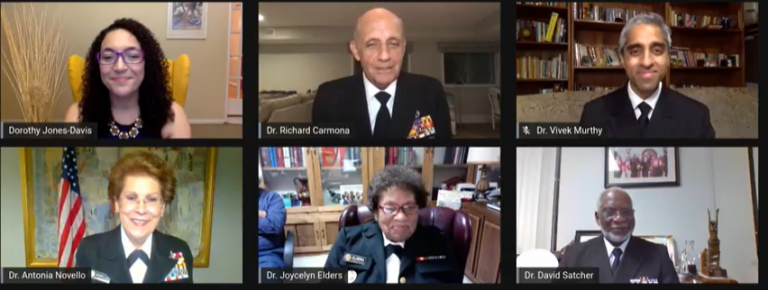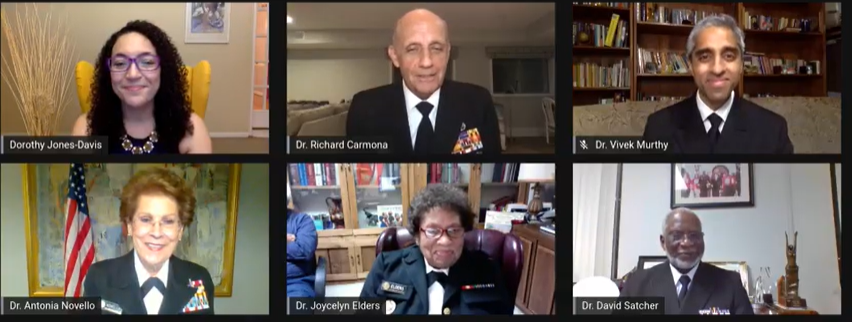ATSU participates in documentary screening, surgeons general roundtable
Posted: September 28, 2020
A.T. Still University of Health Sciences (ATSU) community members took part in a unique event Thursday, with the initial screening of a documentary and a roundtable discussion featuring five former U.S. surgeons general, highlighting racial inequality in healthcare and presenting steps toward solutions in the industry.
Participants got a first look at “Open Season: Racism and Health Disparities, the Two Deadliest Diseases in America,” a new documentary by filmmaker and producer Crystal Emery. The film told stories of racial and ethnic minorities’ healthcare experiences, highlighting disparities between their level of care and that of white Americans.
In one example, a Black woman named Kebra told a story about her experience at a dentist’s office. Her son needed urgent care for a toothache, but the receptionist demanded she pay a prior balance and the costs for the scheduled appointment. When Kebra asked for a payment plan, she was denied.
She told her friend, who is white and also had an unpaid prior balance, about the experience. When her friend went to the same dentist’s office under the same circumstances, the same receptionist offered her a payment plan.
Those themes were among the many discussed by former U.S. Surgeons General Dr. David Satcher, Dr. Antonia Novello, Dr. Joycelyn Elders, Dr. Richard Carmona, and Dr. Vivek Murthy in a roundtable organized by URU, The Right to Be, Inc., a nonprofit founded by Emery.
Dr. Satcher said conversations about racial and ethnic healthcare disparities have been ongoing for years, but impacts are not always widely seen until something like the current COVID-19 pandemic.
“Disproportionate hospitalizations, disproportionate deaths. It’s hard to separate our health disparities from racism and other issues that impact on how well we do, especially facing a crisis like COVID-19,” he said.
Dr. Novello, who was the first woman and first person of color to serve as U.S. surgeon general, highlighted coronavirus-impact disparities in Hispanic communities.
“We have racism and we have biases and we have chronic stress, but more than anything we have injustice,” she said. “We are 18.3% of the American population and at least 33% of the cases and three-times the chances of getting infected, two-times the chances of dying.”
She linked much of the issue to workplace risks, citing numerous high-risk jobs of which Hispanic people are the “face of the industry.”
“The epicenter for Hispanics are those factories where you have the slaughtering of cattle and poultry,” Dr. Novello said, adding that many are migrant workers permitted by the U.S. government. Given their important role in the nation’s food security, this demographic can no longer be ignored, she said.
Dr. Elders spoke about disparities in rural America, noting they extend across all races in areas facing numerous healthcare challenges.
“They do not have the same kind of access to healthcare. There are fewer specialists. They are less likely to have health insurance. Many rural hospitals are being closed. They don’t always have the kinds of equipment they need,” she said. “Rural healthcare is neglected and we need to pay more attention.”
Dr. Carmona also noted the importance of access in bringing about change in healthcare disparities.
“When you’re impacted with external forces like a COVID-19 and don’t have access to care, don’t have a regular doctor, don’t have access to medications, maybe you haven’t been immunized appropriately, all of these things are still existing today,” he said. “The thing that concerns me the most today is they are not a lot different than what they were a half-century ago.”
Dr. Satcher said a key to solving issues is for physicians to listen to their communities and understand problems being faced. He also called for a concerted effort toward encouraging Black Americans to enter healthcare fields.
“We need more African Americans to go into medicine. We need to push it very early. Otherwise, we won’t be successful. We need more people who understand the plight of the people, who are willing to take it on,” he said.
Through it all, Dr. Murthy said physicians should remember what they are.
“You are a healer, and you are a healer because you have the ability to love, to be compassionate, and to be kind,” he said. “We can have the best policies in the world, but without individuals looking out for each other and supporting each other, society doesn’t get stronger.”
ATSU, Texas Christian University, and the University of North Texas Health Science Center were among the event sponsors.
